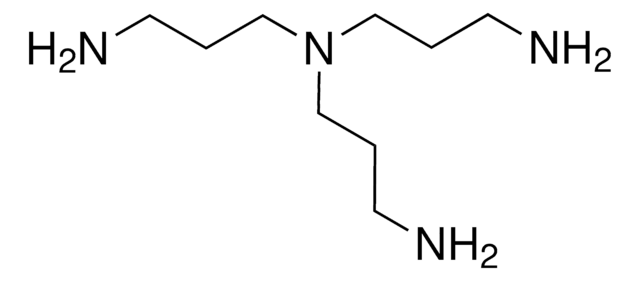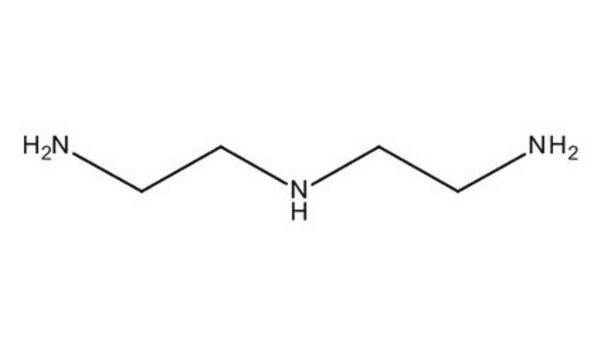All Photos(2)
About This Item
Linear Formula:
NH2CH2CH2(NHCH2CH2)2NH2 · xH2O
CAS Number:
Molecular Weight:
146.23 (anhydrous basis)
EC Number:
MDL number:
UNSPSC Code:
12352100
PubChem Substance ID:
NACRES:
NA.22
Recommended Products
vapor density
~5 (vs air)
Quality Level
vapor pressure
<0.01 mmHg ( 20 °C)
assay
98%
form
liquid
bp
272 °C (lit.)
mp
45-48 °C (lit.)
functional group
amine
storage temp.
−20°C
SMILES string
O.NCCNCCNCCN
InChI
1S/C6H18N4.H2O/c7-1-3-9-5-6-10-4-2-8;/h9-10H,1-8H2;1H2
InChI key
XJFQPBHOGJVOHU-UHFFFAOYSA-N
Related Categories
Application
Triethylenetetramine hydrate has been used as solvent to develop cellulose collector with immobilized triethylenetetraminepentaacetic acid groups for multielement preconcentration in flow system.
signalword
Danger
hcodes
Hazard Classifications
Acute Tox. 4 Dermal - Aquatic Chronic 3 - Skin Corr. 1B - Skin Sens. 1
Storage Class
8A - Combustible corrosive hazardous materials
wgk_germany
WGK 2
flash_point_f
235.4 °F - closed cup
flash_point_c
113 °C - closed cup
ppe
Eyeshields, Faceshields, Gloves, type P3 (EN 143) respirator cartridges
Choose from one of the most recent versions:
Already Own This Product?
Find documentation for the products that you have recently purchased in the Document Library.
Customers Also Viewed
Cellulose TETPA: a chelating collector designed for multielement preconcentration in flow systems.
Burba P, et al.
Fresenius Journal of Analytical Chemistry, 346(4), 414-419 (1993)
Thien Van Truong et al.
Colloids and surfaces. B, Biointerfaces, 193, 111101-111101 (2020-05-21)
We report the first observation of an efficient, native membrane conjugation mechanism via positively charged, linear oligo-amines. Clustering of membrane fragments relies on electrostatic interactions between the net negative charge of the membranes and the positively charged, water-soluble mediators. This
Our team of scientists has experience in all areas of research including Life Science, Material Science, Chemical Synthesis, Chromatography, Analytical and many others.
Contact Technical Service











